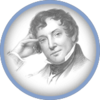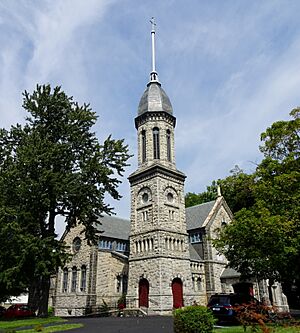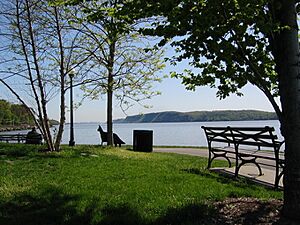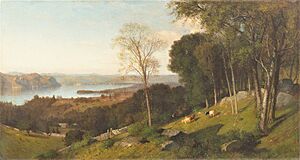Irvington, New York facts for kids
Quick facts for kids
Irvington on Hudson, New York
|
||
|---|---|---|
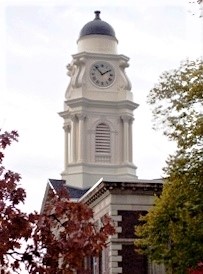
|
||
|
||
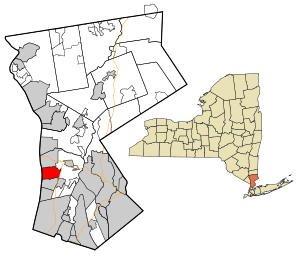
Location of Irvington, New York
|
||
| Country | United States | |
| State | New York | |
| County | Westchester | |
| Town | Greenburgh | |
| Area | ||
| • Total | 4.08 sq mi (10.57 km2) | |
| • Land | 2.79 sq mi (7.23 km2) | |
| • Water | 1.29 sq mi (3.34 km2) | |
| Elevation | 125 ft (38 m) | |
| Population
(2020)
|
||
| • Total | 6,653 | |
| • Density | 2,384.24/sq mi (920.67/km2) | |
| Time zone | UTC-5 (Eastern (EST)) | |
| • Summer (DST) | UTC-4 (EDT) | |
| ZIP code |
10533
10503 (Ardsley-on-Hudson) |
|
| Area code(s) | 914 | |
| FIPS code | 36-37803 | |
| GNIS feature ID | 0953803 | |
Irvington, also called Irvington-on-Hudson, is a small village in Westchester County, New York, United States. It is part of the town of Greenburgh. This village is a suburb of New York City, located about 20 miles (32 km) north of Manhattan.
Irvington is known as a "commuter town." This means many people live here and travel to New York City for work. The village has a train station on the Metro-North Hudson Line, making it easy to get to the city.
The village's Main Street area is about half a mile long. It has been recognized as a historic district. In 2010, Westchester Magazine even called Irvington the "Best Place to Live in Westchester."
Contents
History of Irvington
Early Days and First Settlers
Long ago, before Europeans arrived, the land where Irvington now stands was home to the Wickquasgeck people. They were a Native American tribe related to the Lenape tribes.
In the 1600s, Dutch settlers came to the area. Later, in 1664, the British took control. The land was eventually bought by Frederick Philipse in 1682. At first, farmers rented the land. By the 1700s, more artisans (skilled workers) lived here.
The Albany Post Road, now called Broadway, was built through the settlement by the 1720s. This road connected New York City with Albany. It led to the opening of inns and taverns for travelers.
From Dearman to Irvington
After the American Revolution, the land was sold to local farmers. In 1848, a man named Gustavo F. Sacchi bought a large piece of land. He then sold it to John Jay, whose grandfather was a famous American Founding Father.
John Jay planned out a village on this land. He named it "Dearman" after Justus Dearman, a previous owner. He started selling land lots in 1850.
However, the way the streets were laid out in a grid pattern was criticized. A famous landscape designer, Andrew Jackson Downing, thought the hilly area would be better with curvy roads.
The side streets off Main Street were first called "A," "B," "C," and so on. Today, they are named after early settlers like Barent and William Dutcher.
The American Revolution and Local Impact
During the American Revolution, the area around Irvington was known as the "Neutral ground." This was a 30-mile (48 km) wide zone between British-controlled New York City and American-held territory.
No big battles happened here. But there were small fights between residents and soldiers. People who stayed in the area often traded with both sides.
After the war, the area grew. The Hudson River Railroad arrived in 1849. This made travel much easier. By 1853, the village of Dearman had about 600 people, stores, and houses.
A New Name: Irvington
In 1854, the villages of Dearman and Abbotsford joined together. They voted to change their name to "Irvington." This was to honor the famous American author Washington Irving. He was still alive and lived nearby at his home, "Sunnyside."
Local leaders convinced the railroad and post office to change their names too. Irvington officially became a village on April 16, 1872.
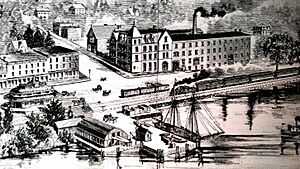
By 1860, Irvington had 599 residents. During the American Civil War, the village was affected by the New York Draft Riots. Special police were brought in to prevent violence from spreading.
With easy train travel, wealthy New Yorkers started buying farms here. They built large summer homes. This made Irvington a place where rich people lived. Businesses like Lord & Burnham, which made greenhouses, also opened.
After World War I, some large estates were divided into smaller lots. New communities were built within the village. Even with these changes, Irvington remains a community with many large houses.
Recent Happenings
In 2016, Irvington Fire Chief Christopher D. DePaoli received a medal for heroism. This award recognizes brave actions.
Since 2014, Irvington has hosted a "Celebrate Irvington" festival. This event takes place on Main Street in early summer.
Geography of Irvington
Irvington covers about 4 square miles (10.5 square kilometers). Most of this is land, but about 1.2 square miles (3.1 square kilometers) is water.
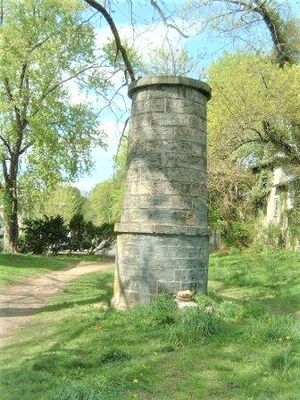
The main road in Irvington is Broadway (Route 9). This road was originally an old Native American path. It became a major road connecting New York City to Albany. It was completed through Irvington by 1723.
Broadway runs north and south, parallel to the Hudson River. It connects Irvington to Dobbs Ferry in the south and Tarrytown in the north. Streets like Main Street extend east and west from Broadway.
You can reach major highways like the Saw Mill River Parkway from Irvington. The Mario Cuomo Bridge is also nearby in Tarrytown.
Commuter trains to New York City are available at the Irvington and Ardsley-on-Hudson train stations. Buses also run on Broadway.
The old Croton Aqueduct also runs through the village. It's now part of the Old Croton Trailway State Park. This historic aqueduct is a National Historic Landmark.
People of Irvington
| Historical population | |||
|---|---|---|---|
| Census | Pop. | %± | |
| 1880 | 1,904 | — | |
| 1890 | 2,299 | 20.7% | |
| 1900 | 2,231 | −3.0% | |
| 1910 | 2,319 | 3.9% | |
| 1920 | 2,701 | 16.5% | |
| 1930 | 3,067 | 13.6% | |
| 1940 | 3,272 | 6.7% | |
| 1950 | 3,657 | 11.8% | |
| 1960 | 5,494 | 50.2% | |
| 1970 | 5,878 | 7.0% | |
| 1980 | 5,774 | −1.8% | |
| 1990 | 6,348 | 9.9% | |
| 2000 | 6,631 | 4.5% | |
| 2010 | 6,420 | −3.2% | |
| 2020 | 6,652 | 3.6% | |
| U.S. Decennial Census | |||
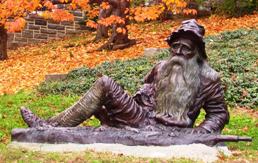
In 2020, Irvington had 6,652 people living there. Most residents are White (82.3%), with smaller percentages of Asian (7.4%) and African American (1.6%) people. About 8.6% of the population is Hispanic or Latino.
Many households in Irvington have children under 18 (37.7%). The village is known for being a well-off community. In 2017, Bloomberg ranked Irvington among "America's 100 Richest Places."
Most homes in Irvington are single-family houses. However, there are also some condominium and apartment buildings. The village has programs to help make housing more affordable.
Businesses and Jobs
Irvington is mostly a "bedroom community," meaning many people commute to New York City for work. But the village also has several interesting businesses and organizations:
- BrightFarms grows salad greens and has its main office here.
- Eileen Fisher is a clothing design company. It has offices and a factory in Irvington.
- Columbia University's Nevis Laboratories is a research center. Scientists here design and build equipment for high-energy physics experiments.
- House Party, Inc. helps promote products by arranging parties.
- Hudson Loft is a large event space with views of the Hudson River.
- Natural Market Food Group, which owns "Mrs. Green's Natural Market" stores, has its offices in Irvington.
Schools and Learning
Local Schools
Most of Irvington is part of the Irvington Union Free School District. This district also includes nearby areas like East Irvington. The schools are:
- Dows Lane School (Kindergarten to 3rd grade)
- Main Street School (4th and 5th grade)
- Irvington Middle School (6th to 8th grade)
- Irvington High School (9th to 12th grade)
The Middle School and High School share a campus.
There used to be a Catholic elementary school called Immaculate Conception School. It closed in 2008. Now, a school for students with learning disabilities, John Cardinal O'Connor School, is in that building.
Colleges and Research
While there are no colleges entirely within Irvington, part of Mercy University's campus is here.
Columbia University has its Nevis Laboratories in Irvington. This lab focuses on advanced physics research. It also has an agricultural research center.
Culture and Community
Irvington is considered one of the "Rivertowns" in Westchester County. These towns are known for their unique culture and feel.
The Town Hall Theater opened in 1902. It was designed to look like Ford's Theatre in Washington, D.C. It was once one of the best "opera houses" in the Hudson Valley. Today, it hosts concerts, plays, musicals, and film series.
In 2021, the Irvington Shakespeare Company was founded. It performs at the Irvington Theater.
Places of Worship
Irvington has several churches:
- Irvington Presbyterian Church (Presbyterian)
- Immaculate Conception Church (Roman Catholic)
- The Church of St. Barnabas (Episcopal)
- Calvary Chapel of Westchester (Evangelical)
The Jewish community is served by synagogues in nearby towns. Irvington also has a Jewish congregation called Rosh Pinah Chavurah of the Rivertowns. The Westchester Buddhist Center is also located here.
Some members of the Unification Church live in Irvington. The church's founder, Reverend Sun Myung Moon, had a large estate here.
Local News
From 1912 to 1998, Irvington had its own newspaper, the Tarrytown Daily News. Now, the The Journal News covers the area.
There are also local weekly newspapers like the Rivertowns Enterprise. The Hudson Independent is a free monthly newspaper. Online news sites like River Journal and Rivertowns Patch also cover Irvington.
Historic Places to See
Irvington has many historic buildings and a historic district. The village protects these landmarks to preserve its history.
Interesting Spots
- Armour-Stiner House (also called the Carmer Octagon House) (1860): This unique eight-sided house is a National Historic Landmark. It was built by Paul J. Armour and later expanded with a dome.
- Churches:
- Church of St. Barnabas (1853): A beautiful stone Gothic church. It was designed by Reverend Dr. John McVickar.
- Irvington Presbyterian Church (1869): A Romanesque church designed by James Renwick Jr.. He also designed St. Patrick's Cathedral, New York. The stained-glass windows were made by Louis Comfort Tiffany.
- Cosmopolitan Building (1895): This building with three small domes was once the headquarters for Cosmopolitan magazine. It's now called the "Trent Building" and houses many different businesses.
- East Irvington Public School (1898, 1925): This old school building is now condominiums. It was once used by children in the East Irvington community.
- Halsey Teahouse (1905): This is the last part of a large estate called "Rochroane." The main mansion burned down, but this small, charming teahouse remains.
- Hermit's Grave (1888): This is the grave of Johann W. Stolting, a hermit who lived in the woods of Irvington. It's the only marked grave in the village. You can reach it by a hiking trail.
- Lord & Burnham Building (1881): This factory building once made greenhouses and boilers. It's now renovated into homes and the Irvington Public Library. Other factory buildings nearby are now commercial spaces called Bridge Street Properties.
- McVickar House (1853): Built for the first rector of St. Barnabas Church. It's now the headquarters of the Irvington Historical Society.
- Nevis (1836): This property was once the estate of James Alexander Hamilton, son of Alexander Hamilton. It's now home to Columbia University's Nevis Laboratories, a physics research center.
- Nuits (1853): A beautiful Italianate villa built as a summer home. It was made with special stone brought from France. It's still a private home today.
- Odell's Tavern (1693): This is the oldest house in Irvington. It was built by Jan Harmse and later became a tavern. It's now a private residence.
- Station Road Tunnel (1837–1842): This tunnel allows Station Road to pass under the Old Croton Aqueduct. It was featured in the 2016 film The Girl on the Train.
- Sunnyside (1656/1835): This was the home of author Washington Irving. He spent 15 years expanding and redesigning the old Dutch farmhouse. Today, it's a museum.
- Washington Irving Memorial (1927): A memorial to Washington Irving designed by famous sculptor Daniel Chester French. It features a bust of Irving and characters from his stories.
- Town Hall (1902): This beautiful building houses the village government. It was designed by Alfred J. Manning. It also has a special "Tiffany Room" with lighting fixtures designed by Louis Comfort Tiffany. A statue of Rip Van Winkle stands nearby.
- Villa Lewaro (1917): This grand mansion was built by Madam C. J. Walker. She was an African American woman who became America's first female millionaire. The house is a National Historic Landmark.
Life in Irvington
In 2010, Westchester Magazine ranked Irvington as the #1 "Best Place to Live." They described it as "charming, quiet, green, with a darling Main Street, stunning river views."
In 2016, Rivertowns Patch rated Irvington as one of the "30 Safest Places To Live In New York." This means it has very low crime rates.
During the COVID-19 pandemic in 2020, many people from New York City moved to Irvington. They were looking for safer places to live.
Parks and Fun
About 35% of Irvington's land is undeveloped public land. And 23% is set aside for parks and recreation. Some parks are for residents only, but others are open to everyone.
- Ardsley Country Club: A private club with a golf course and curling club.
- V. Everit Macy Park: A county park partly in Irvington. It has ballfields, a playground, and a memorial to the Irish famine.
- Irvington Woods Hiking Trails: A large network of hiking trails. You can explore the woods, see the Irvington Reservoir, and find the Hermit's Grave.
- Old Croton Trailway State Historic Park and Trail: A popular path for biking and jogging that runs through the village.
- Scenic Hudson Park: Located by the river, this park has ballfields, playgrounds, walking paths, and a boat launch. It's a very popular spot.
- Irvington Boat and Beach Club: A private club by the river. In 2018, a runaway construction barge from the nearby Governor Mario M. Cuomo Bridge crashed into and destroyed its pier.
Places to Eat
Irvington has a growing number of restaurants. Some popular ones include:
- "Mima Vinoteca" on Main Street.
- "Red Hat" and "Chutney Masala" (an Indian Tandoori restaurant).
- "MP Taverna" in the old Lord & Burnham warehouses.
- "La Chinita Poblana," a Mexican restaurant.
- "Sambal Thai and Malaysian" for Thai and Malaysian food.
- "Brrzaar," a café in the former train station house.
- "Irvington Delight Market," a bodega known for its homemade Middle Eastern food.
Famous People from Irvington
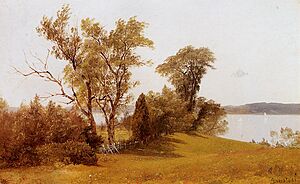
Many interesting people have lived in Irvington over the years:
Past Residents
- John Jacob Astor III: One of the wealthiest men in America.
- Albert Bierstadt and Samuel Colman: Famous landscape painters.
- Chauncey M. Depew: President of the New York Central Railroad and a U.S. Senator.
- Cyrus W. Field: Laid the first transatlantic telegraph cable.
- James Alexander Hamilton: Son of Alexander Hamilton.
- Sun Myung Moon: Founder of the Unification Church.
- Lillian Nordica: A famous opera singer.
- Charles Lewis Tiffany and his son Louis Comfort Tiffany: Founders of Tiffany & Co.. Louis Comfort Tiffany designed the stained glass in the Presbyterian Church.
- Madam C. J. Walker: America's first female millionaire.
- Stan Getz and Mel Lewis: Famous jazz musicians.
- William Black and Julianna Rose Mauriello: Actors born in Irvington.
- Joan Blondell, Jack Cassidy, Shirley Jones, Shaun Cassidy, Patricia Neal, Debra Winger, and Arliss Howard: Actors who lived here.
- Ted Mack: Host of Ted Mack's Original Amateur Hour.
- Wally Pfister: Oscar-winning cinematographer.
- Julius La Rosa: Singer.
- Lucia Perillo: Poet.
- Robert K. Massie: Historical author.
Current Residents
Some notable people living in Irvington today include:
- Michael Douglas and Catherine Zeta-Jones: Famous actors.
- Danny Balin: Professional golfer.
- Storm Field: Retired TV weatherman.
- Eileen Fisher: Clothing designer.
- Monica Getz: Co-founder of Sesame Workshop.
- Bob James: Jazz musician.
- David A. Kaplan: Journalist and author.
- Peter Martins and Darci Kistler: Famous ballet dancers.
- Jon Scott: Fox News newscaster.
- Meredith Vieira: Television host.
- Dan Peres: Memoirist and editor.
See also
 In Spanish: Irvington (Nueva York) para niños
In Spanish: Irvington (Nueva York) para niños


